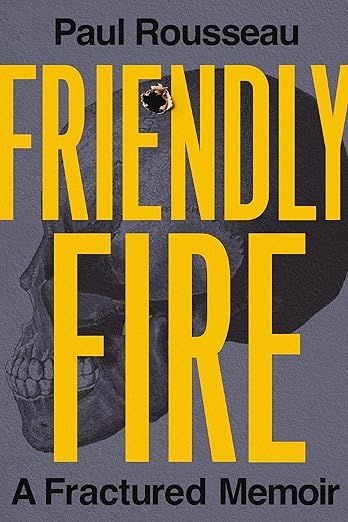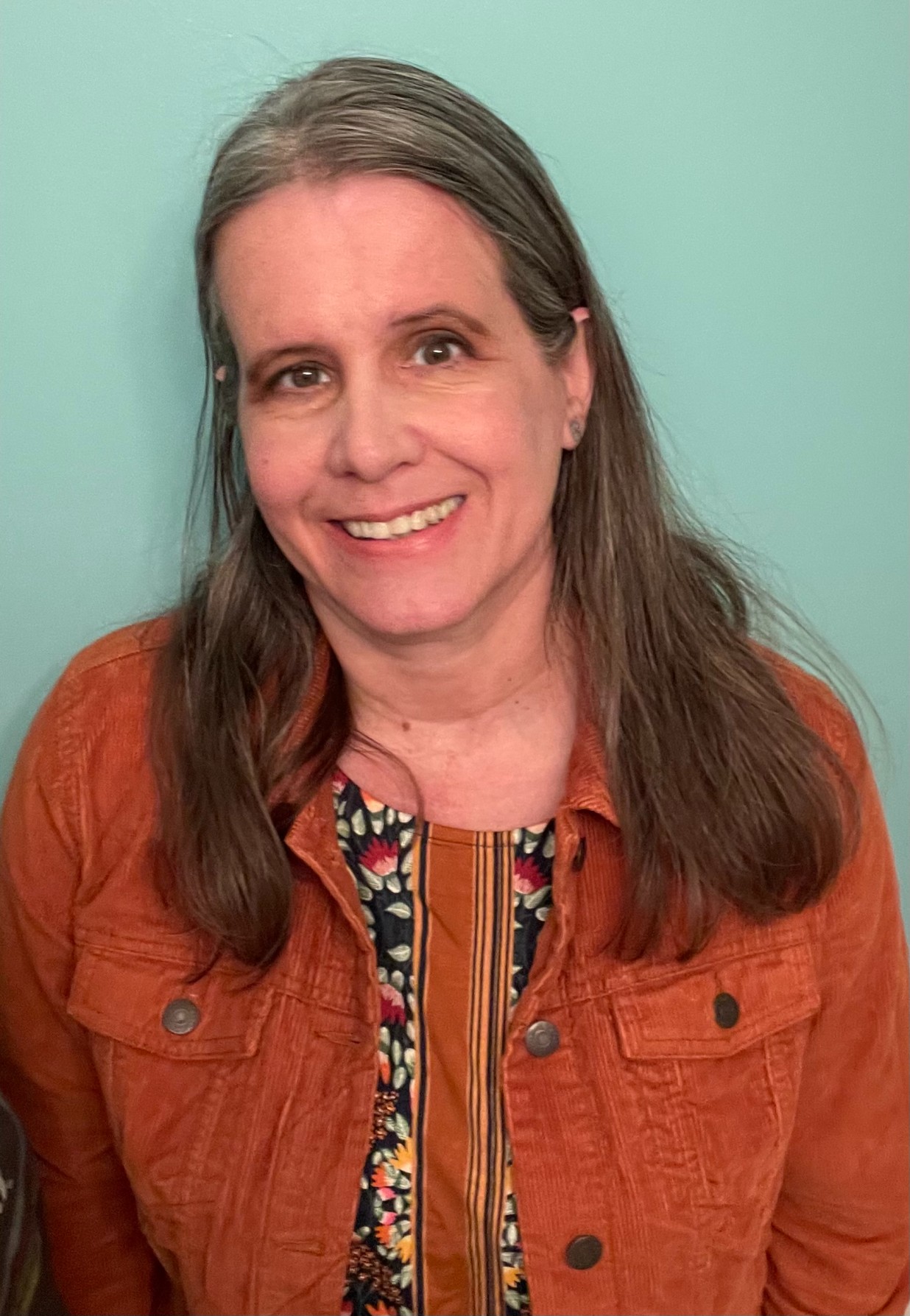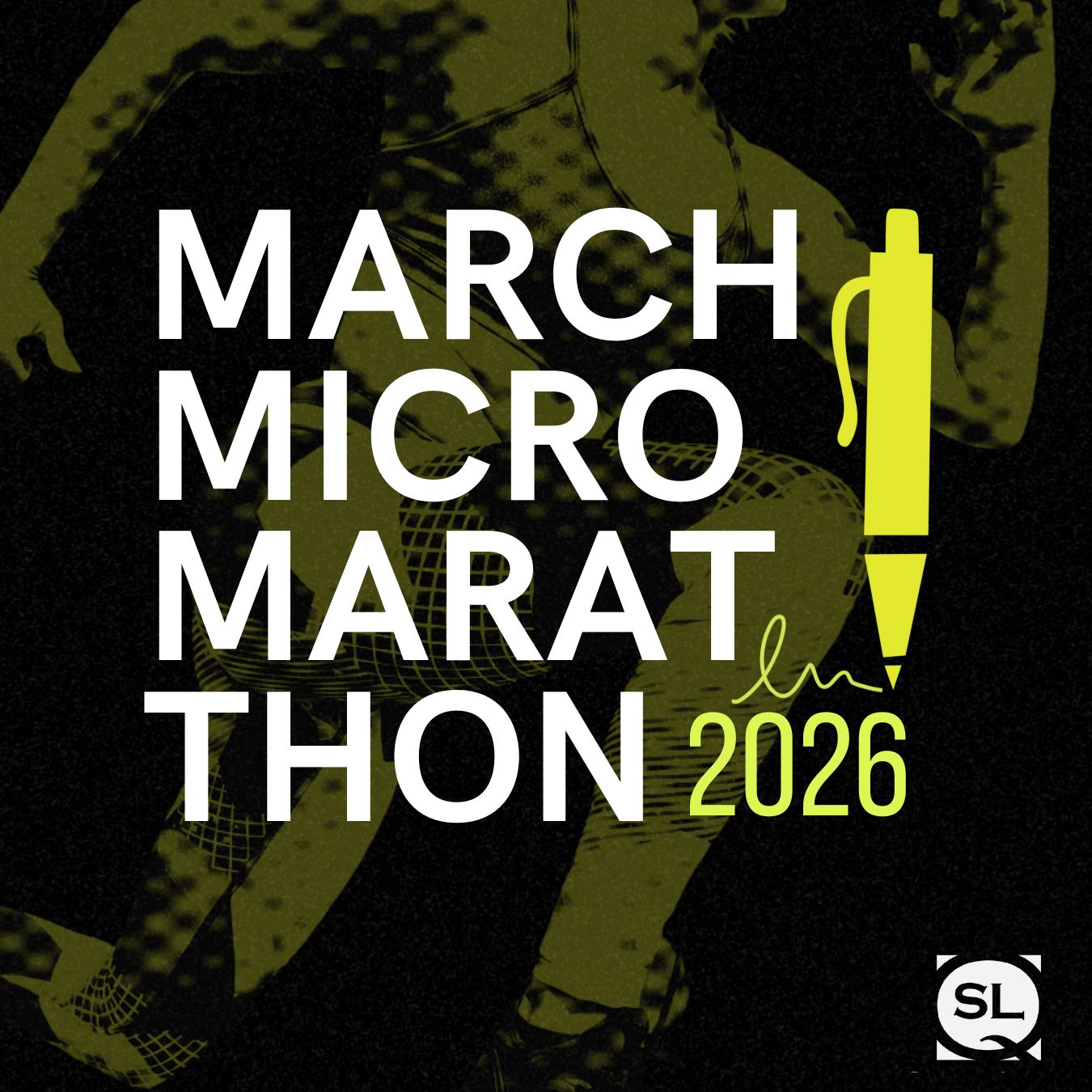
Reviewed by Amy Cipolla Barnes
Paul Rousseau’s debut memoir, Friendly Fire, feels like a shot across the memoir bow. Told in fractures, there’s no meandering exposition, just an unflinching, rapid-fire account of a polarizing event – and what happens next. Rousseau doesn’t hesitate in introducing the book’s pivotal moment: he’s accidentally shot by Mark, his long-time college roommate and friend. Tied together by friendship and music, the two are forever linked — and ultimately unlinked — by the shooting.
Rousseau writes in a sparse tone, in the way this memoir needs to be read. Readers are allowed to process the shooting along with him, with the benefit of time and perspective. Rousseau refers to his own speech in a similar way.
“I speak in short staccato bursts from my throat, lots of time elapsing.”
The reactions to the event are equally pivotal. Rousseau is conscious. Mark is conscious of protecting himself. The moments between Paul and his family, his empathy for others even as he’s been shot, and the traumatic brain injury (TBI) help define the memoir’s people. Rousseau skillfully adds these details, keeping pace with the cinematic-form memoir.
The titular play on friendly fire is skillful framing: the military meaning, literal gunfire, and figurative fire blazing through the friendship and Rousseau’s life.
Dark humor lightens the heavier topics: deep fried pickles as motivation, a father that looks like Keanu Reeves, responses to nurses asking if Rousseau knows who the President is, tripping on silly putty feet, and walking like a child picking a Halloween house.
Rousseau’s use of sensory details is immersive: a pool of cough syrup, wearing layers of yarn, buzzing ears, paralyzed legs, a blaring fire alarm, a face strung with a thousand fishhooks towing five hundred bags of sand, and an indent the length of a peppermint candy.
Surgery and Rousseau’s physical recovery are crucial. Perhaps the defining moment is this – a realization:
I qualify as Disabled. I identify as Disabled. Both with a capital letter “D.”
We don’t hear Mark speak until he enters the room, apologetic. By this point, Rousseau feels desperate but has an awareness Mark wants to help, finally. He is still empathetic towards his friend.
I think about Mark’s race tomorrow and wonder if he’ll still feel up to going after all this. He hides the AR-15 inside a guitar case. I’m still rinsing off. Blood and loose hair run down the drain like sediment. I have a haircut scheduled tomorrow. I consider excuses for the hole in my head, things I’ll make up to tell the stylist: Just cut around the gash. I’m under the illusion that things can and will go back to normal. Perhaps even soon.
The duality of the guitar case is striking. It’s used to hold money when they’re busking together; to have Mark try to hide his rifle there is yet another affront to their friendship.
We gave, took, and shared with sincerity, our guitars having the conversations we could never.
Rousseau’s earlier writing illustrates being shot isn’t a new fear for him. When Mark accidentally shoots him, he becomes the Messenger he wrote about.
As a young person, instead of writing fiction and entering the mind of made-up characters—before I knew the term; before I knew it even had a term—I preferred ghostwriting. I wrote these in an ongoing computer document prophetically titled “The Messenger Always Gets Shot.”
The initial fractures feel like they may also foreshadow Rousseau’s relationship with his narcissistic dad. The connection to his mother feels stronger (or at least more present) as he contemplates not getting in an ambulance because she can’t afford it and echoes her wary skepticism that the university has sent a priest without ulterior motives to protect their interests.
Dad simply blipped into my life again, as though by magic or teleportation. I’m unsure if this is my father or just a delusion. Stranger things have happened in the last twenty-four hours. It is bizarre seeing him in a specific, chaotic place, for such a specific, chaotic reason. Seeing him at all is such a rarity. I get oddly excited.
Telling and emotional words come in Rousseau’s letter to his once-friend Mark. Instead of explaining to readers Mark has continued to behave badly and remain absent from his life, Rousseau uses an epistolary response to fill in some blanks.
Dear Mark, What the hell. That was weird, man. What the hell. What did a gun make you feel that I didn’t? A firearm. Our friendship. You made a choice.
You’ve made no contact with me since the shooting.
Are you happy I didn’t die? Here is a thought experiment: It’s five years after the shooting. Our memories of each other must be distorted, corrupted. We meet again, by chance, as we are now. Do we become friends? Truthfully, I give it fifty-fifty.
Rousseau’s relationship with his father at times mirrors his one with Mark. An empathetic son and narcissistic father. An empathetic friend and narcissistic friend. The closing line of the memoir could be Rousseau thinking about his father and Mark. But I love him, he’s my friend.
Mom makes him delete it. I don’t think he knows what he’s doing is wrong. Or he knows and is just a sociopath. But I love him; he’s my father.
Friendly Fire is the story of a man who has analyzed his life and come to fractured conclusions, while writing a fractured memoir. This is memoir writing at its best. Thoughtful. Vulnerable. Palpable. Empathetic. Hopeful. Rousseau also seems to have written his way into forgiveness. In his letter to Mark, he’s still trying to mend the friendship and offer forgiveness.
I know you’re sorry. We’re past apologies. I forgave you the moment it happened.
The memoir leaves unspoken questions. Can we ever truly forgive? What are the long-term effects of trauma? Is friendly fire (especially from a friend) ever really friendly? I’m left thinking about these sentences. They’re a blunt summation, a painful reminder this complicated memoir is only the beginning of Rousseau’s story.
Physically, I’ve survived. I’m surviving.
Friendly Fire: A Fractured Memoir (Harper Horizon, 256 pages) is available for pre-order HERE.
_____________________________
 Amy Cipolla Barnes is the author of three collections: Mother Figures (ELJ Editions, 2021), Ambrotypes (Word West LLC, 2022), and Child Craft (Belle Point Press, 2023). She has words at The Citron Review, SmokeLong Quarterly, Spartan Lit, JMWW Journal, No Contact Mag, Paragraph Planet, Complete Sentence, Gone Lawn, The Bureau Dispatch, Stanchion, The New Territory, X-R-A-Y Lit, McSweeney’s, -ette review, Reckon Review, Cease, Cows and many other sites. Her writing has been nominated for Best of the Net, the Pushcart Prize, Best Microfiction, long-listed for the Wigleaf Top50 in 2021-2024, and included in The Best Small Fictions, 2022. She’s a Fractured Lit Associate Editor, Gone Lawn co-editor, Ruby Lit assistant editor, Narratively Chief Submissions Reader, and reads for The MacGuffin, The Best Small Fictions, The Porch TN, and CRAFT.
Amy Cipolla Barnes is the author of three collections: Mother Figures (ELJ Editions, 2021), Ambrotypes (Word West LLC, 2022), and Child Craft (Belle Point Press, 2023). She has words at The Citron Review, SmokeLong Quarterly, Spartan Lit, JMWW Journal, No Contact Mag, Paragraph Planet, Complete Sentence, Gone Lawn, The Bureau Dispatch, Stanchion, The New Territory, X-R-A-Y Lit, McSweeney’s, -ette review, Reckon Review, Cease, Cows and many other sites. Her writing has been nominated for Best of the Net, the Pushcart Prize, Best Microfiction, long-listed for the Wigleaf Top50 in 2021-2024, and included in The Best Small Fictions, 2022. She’s a Fractured Lit Associate Editor, Gone Lawn co-editor, Ruby Lit assistant editor, Narratively Chief Submissions Reader, and reads for The MacGuffin, The Best Small Fictions, The Porch TN, and CRAFT.

 In its third year, The March Micro Marathon will be, as usual, a prompt-a-day whirlwind for 24 days. You’ll exchange drafts of micro fiction, non-fiction, and prose poetry in small groups and gather for a series of online events (all recorded for participants unable to attend live). We’ll finish with 3 competitions, and participants who are not already in SmokeLong Fitness will be invited to workshop with SmokeLong Fitness until the end of April!
In its third year, The March Micro Marathon will be, as usual, a prompt-a-day whirlwind for 24 days. You’ll exchange drafts of micro fiction, non-fiction, and prose poetry in small groups and gather for a series of online events (all recorded for participants unable to attend live). We’ll finish with 3 competitions, and participants who are not already in SmokeLong Fitness will be invited to workshop with SmokeLong Fitness until the end of April!